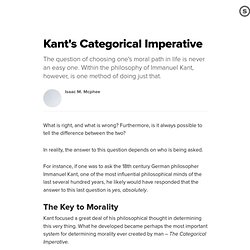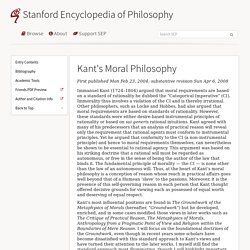

Immanuel Kant and the Categorical Imperative. For sometime now philosophers have discussed the possibility of the existence of right and wrong.

The issues of morality and ethical decision-making figure predominantly in studies on human conduct. Various theories have been offered throughout the centuries in an attempt to answer the question, "Do morals exist? " The great German Idealist philosopher of the 19th century, Immanuel Kant (1724-1804), gave considerable thought to this question. In this essay I shall present and critically analyze Kant's particular view of meta-ethics(1) in order to determine if his reasons render sufficiently why we ought to accept a practical moral point of view.
Before such an analysis and evaluation can be given, I shall advance some antecedent terminology for the reader's appreciation of Kant's trek. The particular work under consideration here will be Kant's Foundations of the Metaphysics of Morals translated by H. It appears that Kant himself adopts the view that morality is the unconditional ought. Kant's Categorical Imperative. What is right, and what is wrong?

Furthermore, is it always possible to tell the difference between the two? In reality, the answer to this question depends on who is being asked. For instance, if one was to ask the 18th century German philosopher Immanuel Kant, one of the most influential philosophical minds of the last several hundred years, he likely would have responded that the answer to this last question is yes, absolutely. The Key to Morality. Kant's Moral Philosophy. 1.

Aims and Methods of Moral Philosophy The most basic aim of moral philosophy, and so also of the Groundwork, is, in Kant's view, to “seek out” the foundational principle of a metaphysics of morals. Kant pursues this project through the first two chapters of the Groundwork. He proceeds by analyzing and elucidating commonsense ideas about morality. The point of this first project is to come up with a precise statement of the principle or principles on which all of our ordinary moral judgments are based. Although these are the two fundamental aims of moral philosophy, they are not, in Kant's view, the only aims.
Throughout his moral works, Kant returns time and again to the question of the method moral philosophy should employ when pursuing these aims. In one sense, it might seem obvious why Kant insists on an a priori method. Perhaps something like this was behind Kant's thinking. Contents 2. Kant's views in this regard have understandably been the subject of much controversy. 3. Sample Essay. A2 Ethics - Wellington College Intranet. Immanuel Kant and the Categorical Imperative. Deontology vs Consequentialism. Episode 06 - Justice with Michael Sandel. HANDOUT Kantian Ethics - PMB introduction. Details Category: ETHICAL THEORY 4 Kant Published on Wednesday, 27 August 2008 10:30 Hits: 6990 Introduction Roger Scruton calls Kantian Ethics “one of the most beautiful creations that the human mind has ever devised” (1996:284).

However Kant also believed that a moral principle could be generated a priori, which means "before experience". Kant’s great project was to prove that reason alone can generate a moral principle such as “thou shalt not kill”, whose validity is not subjective, but objective (valid for all people everywhere and at any time). For this morality is built on practical reason alone, and nothing else: a type of reasoning which is very different from scientific reasoning, for example, which he calls “pure reason”, because practical reason belongs purely to the realm of ideas. Kant's Moral Philosophy. Book Research. Ethics by Peter Singer pg 39. Ethics - Introduction to ethics: Duty-based ethics.